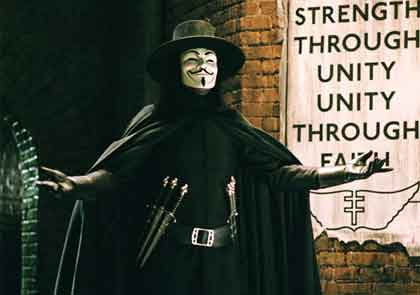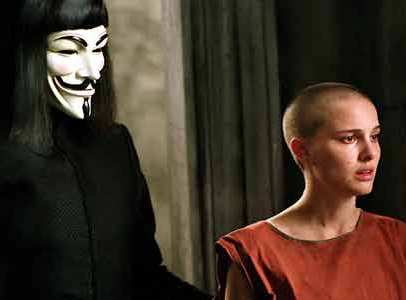 Verily, my view on V for Vendetta vacillates. Even with visage veiled, the venerable Hugo Weaving’s voice brings vim and verve to the verbose, volatile, and vindictive vigiliante. Natalie Portman is vivacious enough as V’s volunteer, and varied English veterans (Stephen Rea, Stephen Fry, John Hurt) bring valuable versimilitude to V’s environs. But, various vignettes notwithstanding, this vaunted venture is less vibrant and versatile than I’d hoped. V is too virtuous, and the villains — from a venal vicar to a vainglorious video host — too vile. Vendetta is a viable version of Alan Moore’s violent vision, I suppose, but a vulgarized one.
Verily, my view on V for Vendetta vacillates. Even with visage veiled, the venerable Hugo Weaving’s voice brings vim and verve to the verbose, volatile, and vindictive vigiliante. Natalie Portman is vivacious enough as V’s volunteer, and varied English veterans (Stephen Rea, Stephen Fry, John Hurt) bring valuable versimilitude to V’s environs. But, various vignettes notwithstanding, this vaunted venture is less vibrant and versatile than I’d hoped. V is too virtuous, and the villains — from a venal vicar to a vainglorious video host — too vile. Vendetta is a viable version of Alan Moore’s violent vision, I suppose, but a vulgarized one.
If you thought the last paragraph was clunky, be prepared for more of the same in V. Vendetta is an enjoyable night at the movies, and definitely an above-average, smarter-than-usual actioner. And Weaving is amazingly dynamic behind the static mask — It’s hard to think of anyone else who could’ve pulled this off quite as well. But, like the last two Matrix films, V‘s bravura moments — the escape from the BBC, V’s talk with the botanist (Sinead Cusack), the domino scene — are too often interspersed with leaden, expository-heavy scenes where the pacing of the film just goes slack. Particularly egregious in this regard is our Batman-ish introduction to V very early in the film, where even Weaving’s mellifluous phrasing can’t salvage a similarly V-intensive monologue. (Frankly, the whole scene needed a rewrite.) The film does eventually recover from this Act I stumble, but it takes awhile.
 And the larger problem with V for Vendetta is that, for all its pretense of moral complexity, it stacks the ethical deck in favor of our terrorist-protagonist. It’s been awhile since I’ve read the graphic novel, but I remember V coming across as a much more unlikable character. He’s a monster created by monstrous circumstances, and as much a symptom as the cure of his society’s larger sickness. But here, V is too (anti-)heroic and charismatic, even given the second act twist, and the government too Orwellian and depraved by far. Who wouldn’t sympathize with rising up against this Taliban-meets-the-Tories outfit? As such, the subtler elements of Moore’s moral economy have been flattened out, and all the choices have been made for us. But perhaps it’s a problem of medium — what worked well on the page comes across as overkill on the big screen. (Exhibit A: Big Brother John Hurt…I liked him better as Winston Smith.)
And the larger problem with V for Vendetta is that, for all its pretense of moral complexity, it stacks the ethical deck in favor of our terrorist-protagonist. It’s been awhile since I’ve read the graphic novel, but I remember V coming across as a much more unlikable character. He’s a monster created by monstrous circumstances, and as much a symptom as the cure of his society’s larger sickness. But here, V is too (anti-)heroic and charismatic, even given the second act twist, and the government too Orwellian and depraved by far. Who wouldn’t sympathize with rising up against this Taliban-meets-the-Tories outfit? As such, the subtler elements of Moore’s moral economy have been flattened out, and all the choices have been made for us. But perhaps it’s a problem of medium — what worked well on the page comes across as overkill on the big screen. (Exhibit A: Big Brother John Hurt…I liked him better as Winston Smith.)
All in all, I’d say V for Vendetta is much better comic adaptation than LXG or, say, Fantastic Four, and on par with the other Vertigo films, From Hell and Constantine. But it’s not a slam-dunk: Vendetta‘s heart is in the right place, but, sadly, something doesn’t quite translate.

Oh I don’t know. It started off choppy, but I was able to accept this reimagined world, sans shades of gray and even with the silly IKEA living rooms, after about 30 minutes. It took me a while to realize we weren’t going to get Lloyd’s color schemes though. Perhaps this was what you thought was missing?
Yeah, maybe that was it. Something felt off in terms of the tone.